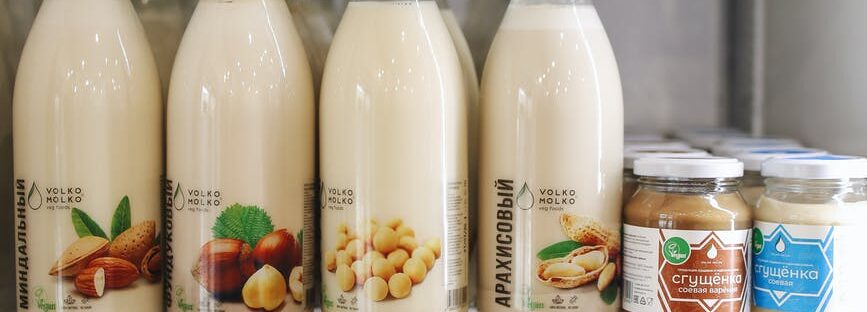If you are converting to a plant-based diet, you might find it difficult to decide which animal products to continue consuming, if any. Dairy products, which are among my husband’s favorites (????????????) can be among the hardest to navigate, in part because of the valuable nutrition they provide, but also the way that dairy cows are treated in modern agriculture. Let’s take a closer look.
Nutrition
Dairy can be a part of a balanced diet. Nutritionally dairy products can be a good source of protein, vitamins/minerals, and carbohydrates. Choosing low or non-fat dairy provides all of the benefits of dairy products while minimizing the saturated fat you’re consuming. You can read more about the nutrient and health benefits of dairy products here. Within the dairy category there is organic and conventional. Nutritionally they provide almost exactly the same- for reference, 1c of low fat (2%) milk contains about 100calories, 8g protein, 107mg sodium, 13g sugar (naturally occurring as lactose), 366mg potassium, calcium and vitamin D.
The spectrum of dairy substitutes such as vegan cheeses or plant-based milks makes it difficult to lump them all into one category. Within the dairy substitutions category there are numerous differences in their nutrition profiles. For our purposes we’ll compare using the non-dairy option Ripple Milk (amazon link). Ripple milk is a pea protein based milk substitute. The unsweetened original flavor provides 8g of protein, 0g sugar, calcium, vitamin D, DHA omega-3s all while being lactose-, nut-, and gluten-free. Ripple as a brand is also concerned about sustainability and how their business practices affect the world.
Looking only at the nutrition content of dairy and comparing it to non-dairy substitutions, you can see there are now more options on the market with food makers creating alternatives that rival their dairy counterparts. Therefore, deciding based on nutrition alone you can see that dairy isn’t inherently “bad” for you but can provide a lot of essential nutrients in your diet. The non-dairy options on the market are not all nutritionally equal, but there are products available that provide a comparable nutritional profile to dairy.
Organic vs Conventional Dairy
The organic label on milk/dairy tells you about the practices and how the cows are cared for- nothing about nutritional content. But even with the organic farm requirements, according to a study conducted at Oregon State University, “many organic and conventional dairies in the study did not meet standards set by three commonly used cattle welfare programs.” Additionally they found that the overall health outcomes for the cows were similar in both organic and conventional dairy farms even though the standards for how the cows were treated are different.
Vegan Lifestyle
Veganism is a lifestyle. Vegans avoid all animal foods, dairy, eggs, honey and any animal derived materials. Following veganism beliefs also means that any products tested on animals or products made from animals are not acceptable. The Vegan Society has a great history and thorough explanation on veganism available to review.
Many people choose to avoid dairy because they’re vegan- they both eat vegan and follow vegan ethical beliefs. Vegans believe that exploitation of animals for any purpose is unacceptable. In addition to the mistreatment of cows, dairy farming is considered a form of animal exploitation. Choosing to avoid dairy products tends to be more about beliefs and ethics rather than the nutrition provided by dairy products.
As with anything in life there will be caveats. Being vegan isn’t black and white, but has a lot of gray. For example, many medications use gel capsules which contain gelatin. Gelatin is not a vegan-friendly ingredient. Assuming there is no other substitution and an individual is prescribed a potentially life-saving medication that contains gelatin, I think we can all agree that the individual should take the medication. Individuals following veganism would likely ask their Pharmacist or their Doctor if there’s an alternative or another form of the medication that does not contain animal products, but sometimes there is no substitute available. In that case, The Vegan Society and Vegans around the world would agree that this is an exception to the rule. This is one of many examples of the shades of gray within the vegan belief system.
The decision of whether or not to consume dairy has multiple factors. There are also environmental impacts to consider, but we’ll discuss those another time. As you can see there is no clear right or wrong answer, but there are tradeoffs. It really depends on what your personal belief system is about the consumption of dairy products and whether or not you are okay with those decisions. This is not a place for judgement, but instead a place for you to find credible information to help you make the most informed decision possible. I hope that this was helpful in your decision making process! ????


1 thought on “Dairy Dilemma”